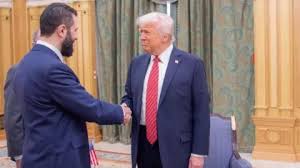US to lift sanctions on Syria: Trump to sign executive order, says White House

Washington, D.C. – June 30, 2025: In a major foreign policy shift, former President Donald Trump has signed an executive order lifting most economic sanctions on Syria. The White House confirmed the decision, calling it a “step toward regional stability.”
This move reverses more than 20 years of punitive actions against the Syrian government. It has sparked mixed reactions both inside the U.S. and abroad.
🔄 A Historic Reversal
The order ends the national emergency with respect to Syria, which began in 2004. That emergency allowed U.S. presidents to freeze Syrian assets and restrict trade. Trump’s new order cancels previous executive actions from Presidents Bush, Obama, and Trump himself.
A senior White House official said the change aims to support Syria’s economic recovery and encourage international cooperation. “We want to help the Syrian people,” the official said. “They’ve suffered enough under conflict and economic collapse.”
🛑 What Remains in Place
Not all restrictions are gone. Some targeted sanctions stay, especially those related to:
- Individuals involved in war crimes or human rights abuses
- Groups linked to terrorism or chemical weapons
- The Caesar Syria Civilian Protection Act (which only Congress can repeal)
These focused measures remain active to pressure key figures like President Assad and his inner circle. The White House stated that “sanctions tied to human rights and terrorism will continue.”
📜 Why the Change Now?
This shift reflects a new U.S. strategy. Instead of isolating Syria, the U.S. now wants to promote recovery and reduce instability in the region.
“Sanctions alone didn’t lead to political change,” said a U.S. diplomat. “But they did hurt regular Syrians. It’s time for a smarter approach.”
Several countries—like the UAE, Jordan, and Saudi Arabia—have already resumed ties with Syria. The U.S. decision aligns with that trend. It also allows for more humanitarian aid and infrastructure rebuilding.
🌍 Global Reactions
International reactions have ranged from cautious optimism to concern:
- The European Union praised the move but called for monitoring Assad’s actions.
- Russia and Iran, allies of Syria, welcomed the decision.
- Israel expressed worry, fearing that Iran-backed militias may gain ground.
Opposition groups in Syria, however, criticized the change. “This rewards a brutal regime,” said one activist. “There has been no justice or reform.”
💬 Domestic Political Response
In the U.S., lawmakers are divided. Some Democrats argue the move lacks accountability.
Senator Bob Menendez said lifting sanctions without a clear deal on rights and democracy was “morally wrong.” He warned it could send the wrong message to other authoritarian leaders.
Republicans close to Trump supported the decision. Senator Rand Paul called it “a win for diplomacy” and said, “The Syrian people need hope, not more punishment.”
🏗️ Economic and Humanitarian Impact
For Syrians, this move could bring real change. The war-torn economy may now receive foreign investment, trade, and aid.
The Syrian pound has already shown signs of improvement. Farmers and small businesses report better access to credit. Aid organizations expect fewer barriers when delivering food and medical supplies.
However, experts warn that Assad’s allies may take most of the gains. “Without transparency,” said a UN analyst, “corruption could continue unchecked.”
🔍 Next Steps
Trump’s order also starts a review of Syria’s label as a state sponsor of terrorism. That label limits arms sales and restricts financial aid.
The U.S. is also evaluating groups like HTS (Hayat Tahrir al-Sham) in northern Syria. Their status may change depending on current alliances and actions.
So far, the Biden administration has not reversed the move. Officials suggest that unless Assad escalates violence or breaks global norms again, the shift will remain.
🧭 Conclusion
Lifting sanctions on Syria marks a bold new path for U.S. policy. It could bring relief to millions but also risks emboldening a government accused of serious abuses.
The world is watching. Will Syria use this opening for reform and rebuilding—or return to old patterns of control? That answer will shape not just Syria’s future, but the legacy of this policy gamble.






